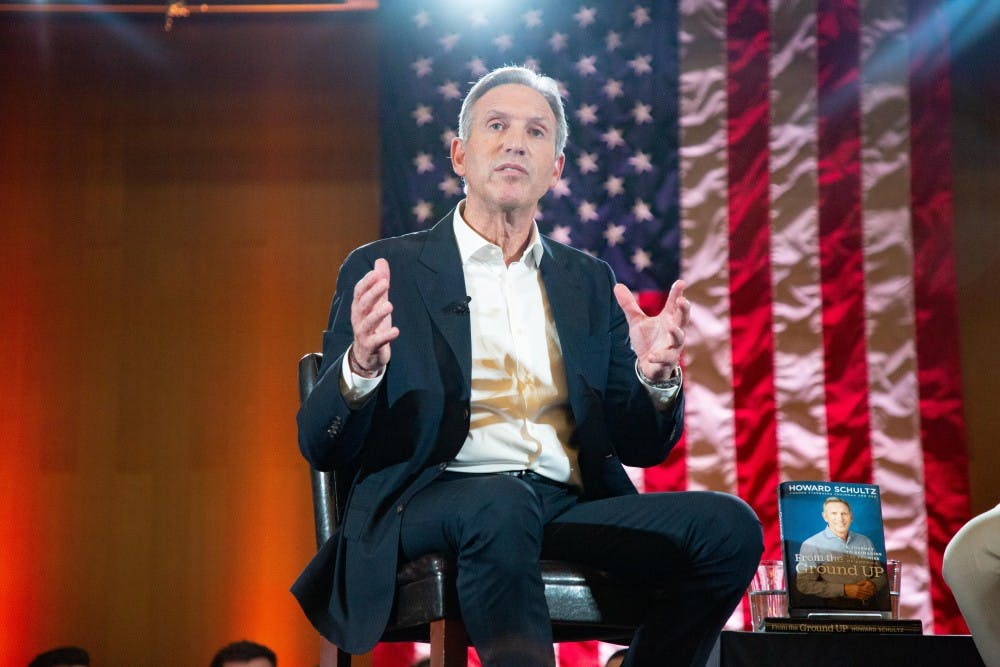Toward the end of January, former Starbucks CEO Howard Schultz announced on "60 Minutes" that he was “seriously thinking” about running for president as a “centrist independent."
Schultz has a history with the University. His former company has the Starbucks College Achievement Plan, which employees can partake in to earn an online undergraduate degree at ASU with full tuition coverage. Schultz was the commencement speaker for ASU’s graduating class of 2017. One would be remiss to mention the many Starbucks locations that dot the ASU campuses and their peripheries.
It seems fitting that Schultz would pick ASU as one of the first stops on his tour to promote his new book. He appeared on stage to speak with ASU President Michael Crow and answer questions from the audience in late January at the Tempe campus.
Read more: Former Starbucks CEO Howard Schultz visits ASU amid talks of presidential run
His tour, including his stop at ASU, has served to provide a glimpse as to what a Schultz campaign would look like. What it has shown is a candidate who lacks political acumen and policy knowledge running on a platform that seems out of touch with everyday Americans — and especially with students.
Schultz framing himself as a “centrist” has aligned himself with a growing number of Americans who don’t identify with either party. Gallup found that in 2017, 42 percent of Americans identified as independent.
This would seem to be good news for Schultz, but the independent label doesn’t necessarily mean centrist.
Josh Fixel, a graduate student studying aerospace engineering, is the president of Bridge ASU, an on-campus club that aims to “bridge” the gap between left and right through civic dialogue on issues facing the nation.
“Him getting his voice out there is representing Americans that aren’t being represented by the two parties,” Fixel said.
However, once Gallup factored which party independent voters leaned toward, eighty-nine percent of voters either identified as or leaned towards one of the two major parties.
“Forty two percent down to eleven — that’s 31 percent of Americans that are not actually voting for what they want to vote for," Fixel said. "I think that shows a serious flaw in the system. That to me shows that the parties themselves need to change, and I don’t know of a more realistic way to change than to get a Bull Moose scenario, to get a strong candidate to be able to run and mix up the political climate. And again whether that is Howard Schultz or not, I don’t know yet.”
It might be right that Americans are not getting what they want out of the two parties, but Schultz has framed himself as economically conservative and socially liberal. A study done on 2016 voters by Voter Study Group found that on traditional liberal/conservative issues, voters who were fiscally conservative and socially liberal made up just under four percent of the electorate in the 2016 election.
This is in stark comparison to the almost 29 percent who consider themselves socially conservative and fiscally liberal, which could perhaps be more accurately definition of centrist.
It’s not clear that Schultz’s policy positions are representative of Americans either.
He has called the national debt the “greatest threat domestically” to America. He has made statements opposing raising taxes on the wealthy, supporting cuts to Social Security and Medicare, while opposing Medicare-for-all plans.
This is out of line with where many voters, especially young voters stand. An October 2018 survey of voters 18-34 found that the top issues were income inequality, health care and immigration. Only six percent of those surveyed felt that the national debt was a top issue.
As statistician Nate Silver noted on Twitter, Schultz’s views are “held disproportionately often by rich and powerful people.” This is an image not helped by his comment that billionaires should be referred to as “people of means.”
At the ASU event, Schultz claimed he would not act as a spoiler in the election and failed to offer specifics on tax policy. It would be hard to imagine any other independent or third-party candidate onstage with Michael Crow being taken as seriously.
While Schultz and Starbucks have been a valuable partner with the University and have done good work by providing opportunities for ASU students and the community, his desire to be president ignores the realities of what Americans and young voters want.
Reach the columnist at djrubio2@asu.edu and follow @DanielRubioAZ on Twitter.
Editor’s note: The opinions presented in this column are the authors’ and do not imply any endorsement from The State Press or its editors.
Want to join the conversation? Send an email to opiniondesk.statepress@gmail.com. Keep letters under 500 words and be sure to include your university affiliation. Anonymity will not be granted.
Like The State Press on Facebook and follow @statepress on Twitter.




